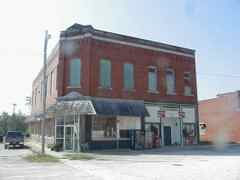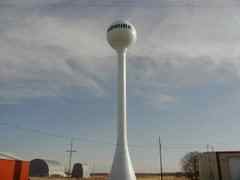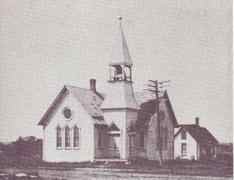 |
History |
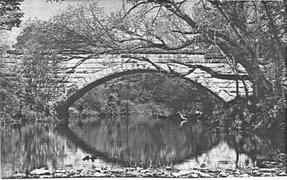 |
|
HISTORY of ADMIRE |
|
The city of Admire, Kansas is located in northern Lyon County, twenty miles northeast of Emporia. Geographically it lies nestled against the foot of the flint hills to the west, and on the edge of the Osage Cuestos region to the east. Thus the industry of the community is evenly divided between the production of beef and grain. The main crops being wheat, corn, sorghum, soybeans and other legumes. In 1886 the Missouri Pacific railroad laid a track through the area, and a station was established at the site of Admire. A town company composed of Jacob Admire, W. E. McElfresh, J. D. Hall, D.J. Roberts, and H. H. Buckwalter was formed for the purpose of planning and seeking to establish a city. They hoped the strategic location would be advantageous in making the town a great cattle shipping Center. Also since Eskridge, and Burlingame were over twenty miles away; the town would become a center of commerce for the community. 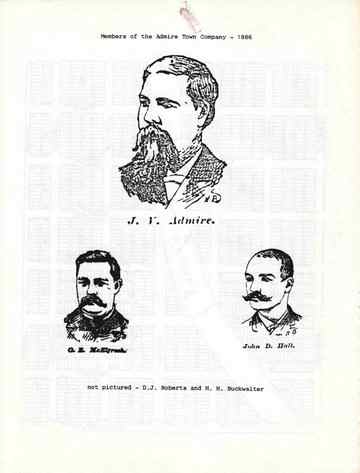
A post office, Waterloo, seven and a half miles S.E. of the present town provided mail facilities for the neighborhood since an early day. Major Hicks, a veteran of the Mexican war, was the first postmaster at Waterloo. Later this post office was discontinued when the post office at Admire was established. When the proposition for a bond issue for the building of the Missouri Pacific railway was agitated in Waterloo township, the west half of the township opposed the bonds and pulled the votes successfully to secure a division of the township. The new township was named Ivy. The Town Company worked in the interest of the railway company to secure the bond issue and afterward these men were given the privilege of buying land for a station and a town site and naming the town. The site selected, oddly enough, is in the Ivy Township which had opposed the railroad. The town was named for the town company's president, Jacob Admire. A story is told that straws were drawn by the town company members, but, however, it was called "Admire City" They chose the site and purchased a quarter section of land from B. H. G. Wilbur for a sum of four thousand dollars. Later, an eighty acre tract was added to the west side of town, but was never developed except for three residences located on the eastern edge of the tract. In 1894, Fremont Miller and Herbert Miller bought all the remaining stock from the Railway Company. At the time the town was founded, it was believed that soon a new county would be formed from northern Lyon County and the southern part of Wabaunsee County. This would leave Admire in a very favorable position to obtain the county seat of the new county. The dream of the town company was never to become a reality. The town did flourish for several years, but it never became the city that had been anticipated. Only a year after the town was founded, hot winds played havoc with the Kansas crops, and the streams went dry. Cattle and hogs became almost worthless, and the great "Boom Bubble" had burst. It left Admire disfigured but still in the ring. 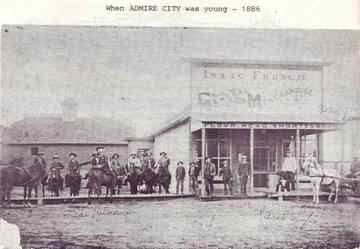
On June 15, 1887, before the drought struck, the town company decided to run an excursion train from Olathe to Admire for the purpose of interesting people in buying lots and settling in Admire. Also, a coal company was being formed and was in need of financial backing. At that time, people thought Admire would rival Osage City as a coal town. Most of the farmers around town had dreams of their land being under laid with good coal. The citizens decided to have a grand picnic that day (June 15, 1887) and it is interesting to recall the delight the home citizens must have displayed in this excursion. The day before, the groves around town were ransacked for nice thrifty trees. The excursionists could not help admiring the beautiful appearance of the town. In one of the speeches given that day one of the visitors remarked how admirable Admire was. The joke was on the town, however, for in a few days when the trees had withered and dried the town had the appearance of being very, very dead. Due to the dry weather that followed and the scarcity of water the citizens decided to dig a town well. An article from the Osage Free Press in 1886 states that the town company is having a well dug in the center of the intersection of the two principle business streets. It will be four feet in diameter in the clear. A wind mill will probably be attached to it. The well was dry as powder, and the project was abandoned. The story is told around town that a practical joker dumped some coal in the well one night. When the diggers came back in the morning, they thought they had struck a vein of coal, and renewed their efforts with vigor One can imagine the surprise of the practical joker when they did strike an eight inch vein of coal. According to the citizens of the town the work was ended when a portion of the well caved in. One man was trapped at the bottom of the well, and rather than risk further loss of life in rescue operations, as another cave in was feared, the well was filled up. The lone well digger still resides one hundred and sixty feet below Main Street. 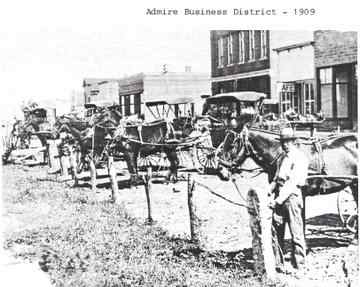
The scarcity of water has been a constant problem in the local area. In 1935, several ponds were constructed as a Government work project (W. P. A.). One was made on the C. A. Paine farm, south of Admire. This gave work to the unemployed as well as giving a source of water for the local farmers. That little town in Northern Lyon County has always been called "AD-mire". We heard the other day of a gentle woman who thinks the name should be pronounced "Ad-Mire," according to the dictionary's rule of the verb. She should let her voice fall right there. The name will not be changed. "Ad-mire" it has been from the beginning "ADmire" it shall be until the end--Rolla Clymer in the El Dorado Times. 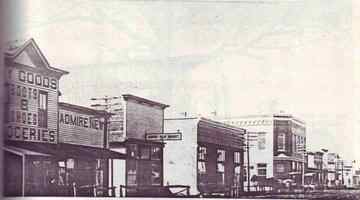
The first school house in Admire was located on the site of the present home of Mr. and Mrs. William Thomas located in the Southeast corner of the town on highway 99. Robert Ogleby told me of his going to school there when he was a small boy. He said there was not much of a town at that time. He lived with his family west of town. One of the early day teachers at this school was a Mr. Nemuel Brown. Mr. Brown was the father of Robert O. Brown, or Bob as he was known by most people. Bob Brown was probably the most well known business man of this town. He came here from Emporia in 1925 and opened the town's first service station, and a year or so later the first bulk oil company for delivery of gas and oil to the farming community. Bob was the son-in-law of Don Larkin and brother-in-law of Ralph Larkin who operated the local grocery store until May 30, 1977. Bob Brown and Kenneth Kline moved the Bank from Miller to Admire in the early 1940's. The bank was moved to Emporia in 1982 and is now known as the Admire Bank and Trust of Emporia. 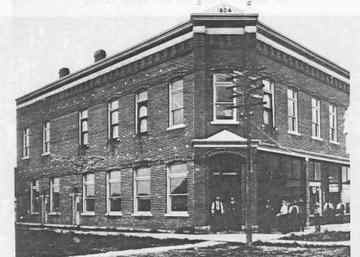
The Town Hall over the former bank and Larkin's store was for many years the hub of all activity in the Community. Mr. R. H. Best was the first owner of the hall which was used for roller-skating, dances, school plays, graduation exercises both grade and High School and Town-Team, Medicine-shows. Does anyone remember Whites Wonder Worker? If you ever lived in a small town in the teens and twenties you'd sure remember them. Also the Lodge put on Movies once a week (silent movies) as talkies didn't come out until '28 or '29. You name it the old Hall had some kind of entertainment for all at some time or another, a great meeting place for young and old. The livery barn was located just south of the Bank building. In the last years it was owned and operated by Oath Wheat and his sons, Oatie, Frank, Jeff and Hunter. This large barn burned to the ground in 1923. For at least two years there was a little excitement in the community; a Rodeo was held at the Frank Putnam ranch about two and one-half miles northwest of Admire. I believe the years that this rodeo was held were 1923 and 1924. This ranch is now owned by Mr. and Mrs. Herbert Heine. There was a Grist-Mill in town up until the late teens. Dave Pitzer was the first owner-operator, he sold out to Fred Putnam. Mr. Putnam and his sons, Ralph and John, operated the mill until such time as it was closed. It was located south of the concrete block building at the east end of 5th Street. 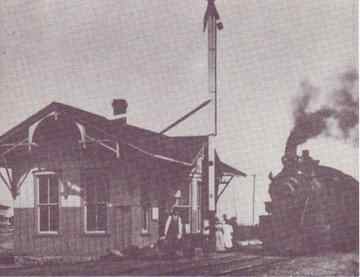
Up until the 40's or 50's all of the small towns on the Missouri Pacific Railroad had a Depot and Depot Agent. There also was a section crew to maintain the tracks. It was referred to as a section gang. They had a section of track, which at Admire was about six miles. The gang or crew generally consisted of the foreman or boss and three to six men. In the summertime, the railroad put on extra gangs. I worked on one in the summer of '31. We were paid 27 cents an hour, a 10 hour day and a six day week. That was a pretty good job in those depressed times. Farm labor was a dollar a day plus room and board. In 1934, a grade school teacher was paid $70 per month. The high school principal was paid $85 per month. Admire as most other small towns had picture shows or "movies" as they were also known. The first I can remember was in a building just east of the church operated by Joe Spencer and Walt Betts. It was a Western starring William W. Hart. For a season or two, Mr. Merrit Frost had a movie in the building where the Post Office is now located. He had a steam powered generator at the east end of 5th Street to furnish electric power for this show. It was very modern for the early '20s. The Odd Fellows lodge also had movies at this time in the Hall. They had a little electric power plant in the rear of Bob Ogleby's garage. In the summertime, the Odd Fellows had an open air theater or "air-dome" on the north side of 5th Street between Gibby's store and the Hieronymus restaurant. For several summers that I can remember, must have been during or about the time of World War I, we had a Chautaugua come to town to put on entertainment for the people. They had a large tent and it was pitched on the school grounds. Clarence Burlingame ran a photo studio in the east room of the hotel for a year or so. Joe Spencer also was an early day photographer in the town. There were, until the late 40s, several cream buying stations. One of the better known or the early ones was Bert Waddle. Mr. Waddle also made and repaired harnesses. John Mannen followed Waddle in harness and shoe repair, also bought cream, eggs, and poultry. 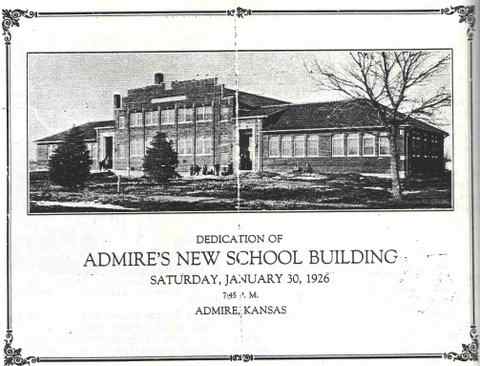 ADMIRE 1887
Issac French is one of the oldest storekeepers in the village. He carries a good line of dry goods always stocked up with the season, groceries, and an immense line of Queensware, notions, etc. He is courteous with his customers and enjoys a good trade. He is also proprietor of the only livery stable in town which is a good paying business. Brown & Grifith carry a line of nearly everything that is eaten or worn. They have an excellent line of dry goods, dress goods, etc. Also their stock of ready-made clothing is very good, out of which from the largest to the smallest man can find a suit which they will sell to him at a very reasonable price. Admire Cooperative Association is a firm composed of fifty farmers. Their stock consists of dry goods, groceries, boots and shoes, hats and capes, etc. It has been running for three years and has been much benefit to the town and country. They have a good growing trade. Our furniture store is owned and operated by Mr. White. He carries a good stock of furniture and sells it at a reasonable figure. He also carries harness and runs a repair shop in connection with his furniture store. He is a new man having purchased of T. S. Courtney about a month ago. He undertakes his business, is a gentleman of good business qualities and is building up a large trade. 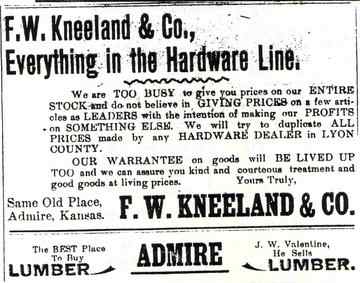
F. W. Kneeland is the proprietor of the only hardware, but his stock is complete in every department and ample to supply the demand. Competition will not affect his trade. He is a practical tinner and manufactures most of the tinware and is, therefore, able to compete with surrounding towns. He is also the only farm implement dealer in town and endeavors to meet the demand in that line as well. He is a very pleasant man to deal with and the people have found it out and give him excellent patronage. J. V. Valentine has a monopoly on the lumber trade, but his dealings are straight and he endeavors to give his customers a good end of the bargain. Thus, there is no complaint and he sells three or four car loads of lumber in some months. He keeps his yard well stocked with good building material. He also keeps lime, cement and mixed paint. 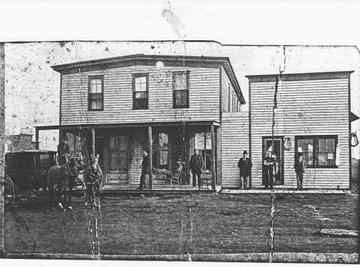
L. C. Larkin is the proprietor of our two story hotel. It is neatly furnished and conducted by himself and family. The tables are always supplied with eatables which would be a credit to many two dollar houses, yet he only charges one dollar. He is an accommodating landlord and deserves the commercial trade which he receives and customers praise his house very highly. A. Christianson, the boot and shoe manufacturer has perhaps the largest trade of any industry in this city. His manufacture and repair business is all that he can attend to, but his work is the best in the country, therefore, the demand for his services. Benjamin Whittredge runs a clean meat market and keeps on hand fresh meats which he sells to his customers at the rate of an average of three beeves a week. He is a polite gentleman and enjoys a large circle of friends and patrons. 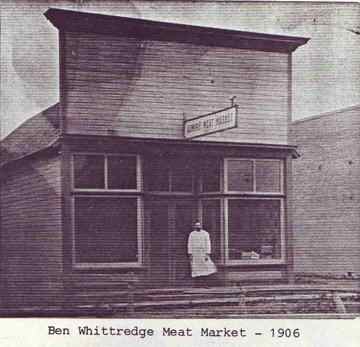
The Blacksmith is run by Craig Anderson. His trade is such that he has to keep from one to three men besides himself employed all the time. He is a good merchant and does his work well. He not only gets the trade in this vicinity but far beyond. Asa Betts is the proprietor of the Wagon Factory and he is a skilled mechanic and does his work well, using only good materials. He manufactures buggies, wagons, and repairs all kinds of wood machinery. Of the several well arranged and kept stores in the little city perhaps none are of a more credit than the drug store owned and run by E. W. Smelser. He keeps it well-stocked with pure drugs, patent medicine, stationery, notions, wallpaper, paint, and oils. He is an exemplary moral young man and is very careful in his business and dispenses his goods in harmony with the times. Miss Effie Larkin is at present the only milliner. She has an elegant stock of all kinds of millinery goods and is a good trimmer. Charles Ebey, one of our carpenters, is a man who is known as one of the best carpenters and builders in the county and is kept busy all of the time. He is a fast worker and an excellent draftsman. David Wagoner is the oldest carpenter in the village and nearly half of the town houses were built under his instructions. He has a shop in town where he makes cabinet works at reasonable figures and his work is of the very best. Griffith and Lucas are the artistic wallpaper hangers and painters. Dr. C. D. Hatcher is one of the physicians and has been practicing at his place about five years and has a large number of friends. He is a very kind and pleasant gentleman. Dr. S. W. Johnson, the other physician, has only been here about three months, but has built up a good practice among the people of this territory. Lucas and Griffith are the proprietors of the only confectionery in town. They keep a good assortment of all kinds of various sweets, nuts, and also ice cream and milkshakes in season. Homer Lucas is the tonsorial artist of the city. He is a good barber and a pleasant gentleman. The school building is a very fine building. It is two stories high with two rooms on the first floor and one on the second. Teachers are Misses Jennie Best and Bell Emerson. W. F. White carries a good line of harness, collars, etc. and does general repair business. A. Stonebraker and J. Romesburg are the two accommodating draymen doing their work carefully and to order. J. R. Henderson and Son are the only plasters. There are two churches--the M.E. Methodist and M.P. Methodist. J. H. Klein is the pastor of the M.E. church and R. H. Stein is pastor of the M.P. church. There is scarcily a week day but you can count during the day from 55 to 100 teams in town, which shows that Admire has a good support behind it. The Admire City Coal and Mining Co. has a capital stock of $10,000 divided into ten shares. The following are the officers and stockholders: J. R. F. Pilcher; W.K. Hadcock; T. J. Morisson; J. W. Robinson, treasurer; W. H. Caylor; J. M. Miller; M.A. Morrow; P. G. Swayer, secretary. The Northern Lyon County Library of Allen, KS has microfilms of all the Northern Lyon County weekly newspapers. The first roll contains the following newspapers in Admire: Admire City Free Press, January 7, 1887 - December 30, 1887; Admire Free Press January 6, 1888 - April 6, 1888; Admire Independent, December 17, 1891 - September 15, 1892; Advance, April 9, 1893 - April 29, 1893; Northern Star, December 12, 1912 - November 22, 1917. |
|
FOUNDING FATHERS |
NAME |
BIOGRAPHY |
| J. V. Admire | 1J. V. Admire, editor of the Osage Free Press, was born in Johnson County Ind. October 15, 1842. He was the son of Rev. James B. Admire of Morgan town, Ind. J.V. Admire was practically thrown upon his own resources at an early age; as his father's family was large, and the salary of a Methodist preacher was very meager. Prior to the war, from the time he was sixteen, he engaged in school teaching. August 12, 1862, he enlisted as a private soldier in Company E 65th Indiana Volunteer Infantry at Newburgh. September 1867, he was married to Miss Emma Lewis. They came to Kansas July 1869 and tried farming in Shawnee County for two years, but abandoned that business in disgust. They bought an interest in the NORTH TOPEKA TIMES of which he was an editor and partly publisher for about a year and a half. He was appointed Postmaster of North Topeka in 1872-1878. In November of 1878, he moved to Osage City and entered into a law partnership with Honorable Elllis Lewis, having been admitted to the bar in 1867. At the expiration of a year he engaged in the other business. On March 1, 1881, he bought the OSAGE FREE PRESS. He was appointed Postmaster of Osage City on Feb. 10, 1882. His children, James Lewis, Mina, and Eli, aged respectively, 12, 11, and 7 (in 1883). Admire City was named by the Drawing of straws. McElfresh's ancestors had wished it had been called McElfresh since this family remained longer in the local area. |
| O. E. McElfresh | 2Oscar Edmond McElfresh moved to Osage City with his family from Paris. Illinois, and in 1885 opened a furniture store in a building the first door west of the present Ben Franklin Store. Mr. McElfresh was United States Postal inspector and planned the first rural routes out of Osage City. He was the owner and operator of the Palace Hotel. In 1885 McElfresh and three other men built the Ottawa, Osage City, and Council Grove Railroad, which later became the Missouri Pacific Line. |
| D. J. Roberts | 1D. J. Roberts was born in Liverpool, England on October 14, 1855. He came to America in 1857 and lived in New York City until 1870. He moved to Emporia, Kansas, where he worked at his trade as a printer until 1873. He established the HERALD at Americus, Kansas, which he published until he moved to Osage City. Kansas. He was married at Americus on September 5, 1881, to Miss Effie Bond. |
| John D. Hall | 1John D. Hall, the secretary and treasurer of the town company was a native of New York. In 1885 came to Osage City and helped to organize the Citizens Bank of which he was President and one of the principal stockholders. |
| H. H. Buchwalter | 1H. H. Buckwalter was a Realtor and Loan Broker in Emporia, with a business address at S. West 6th. His wife was Mary Buckwalter, and their home address was 710 Merchant. |
|
© 1) Source - ANDREA'S HISTORY OF KANSAS "Published 1883" |
| All content - 2013 © City of Admire, Kansas and its representatives. All rights reserved. |
